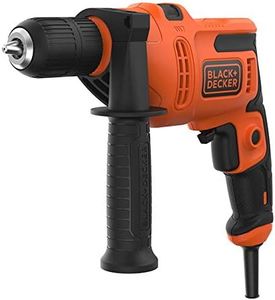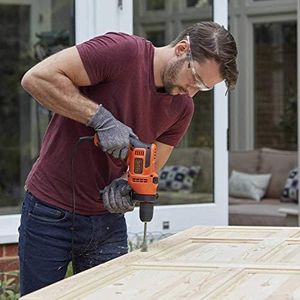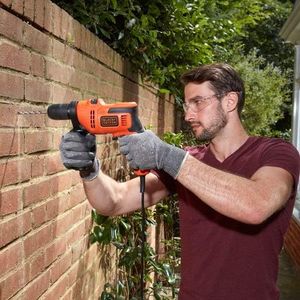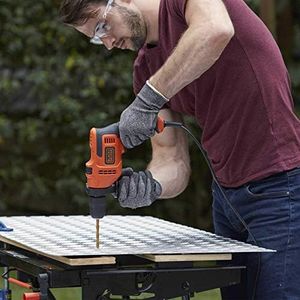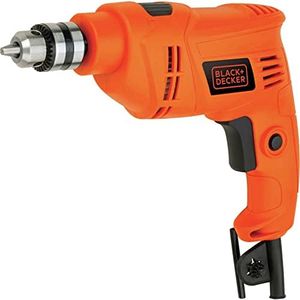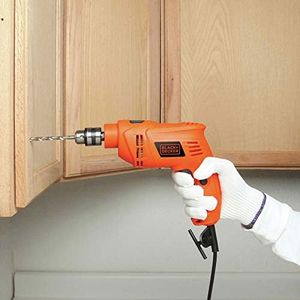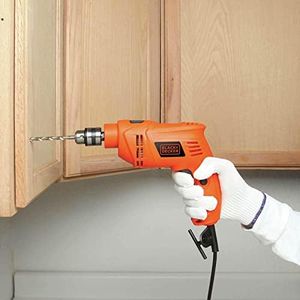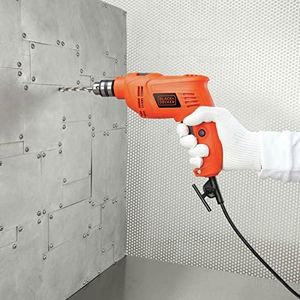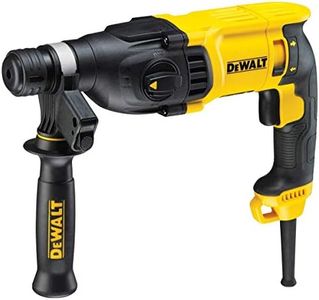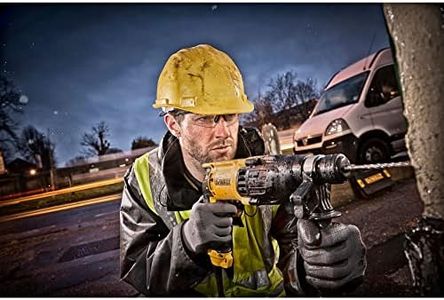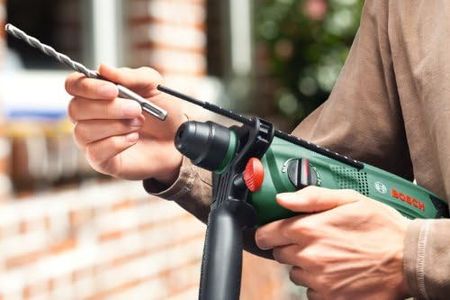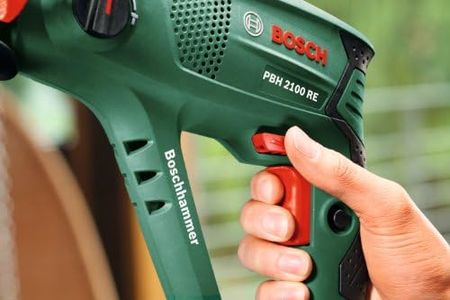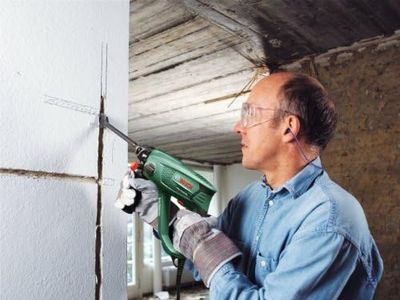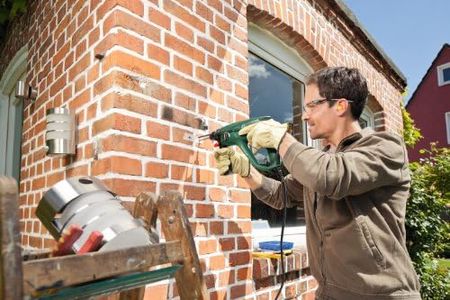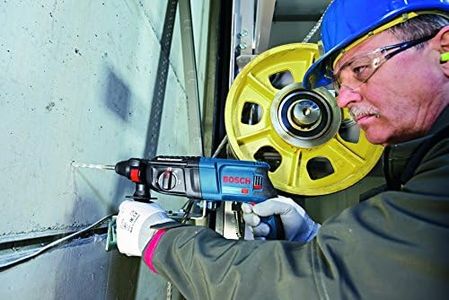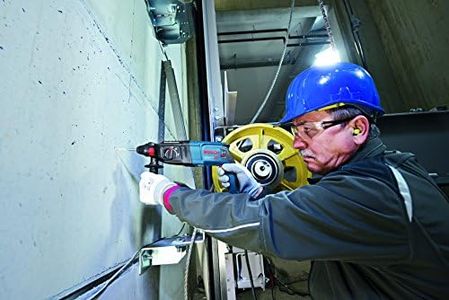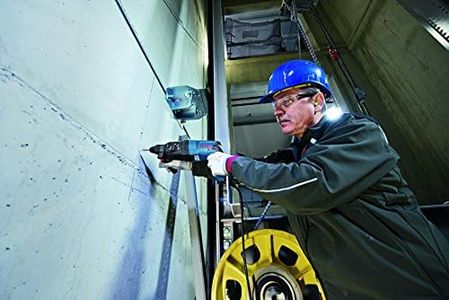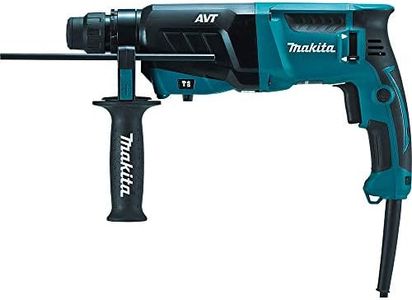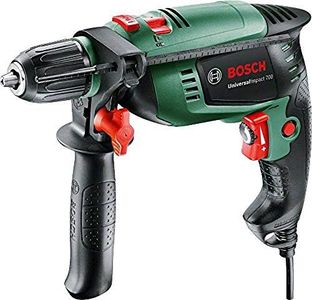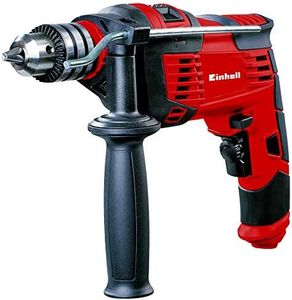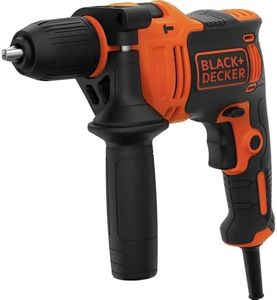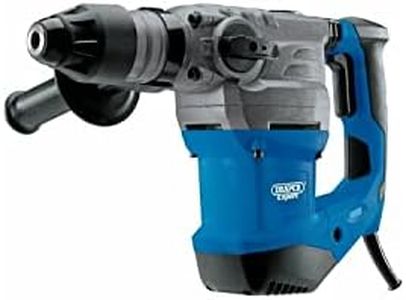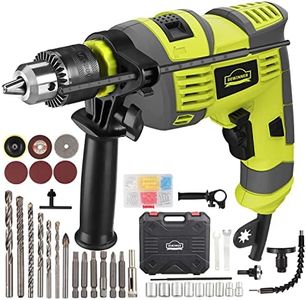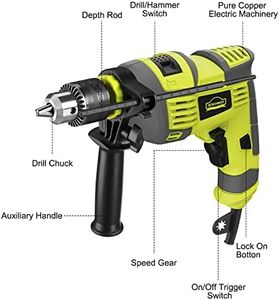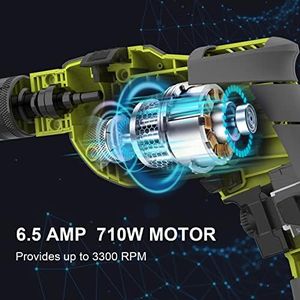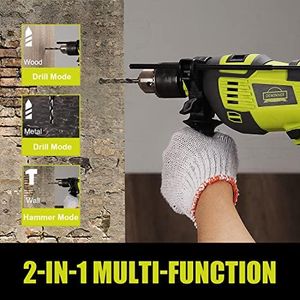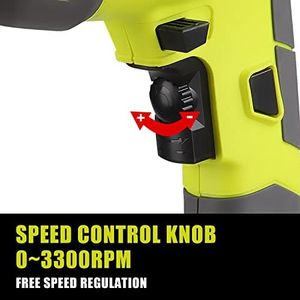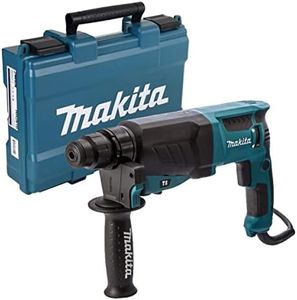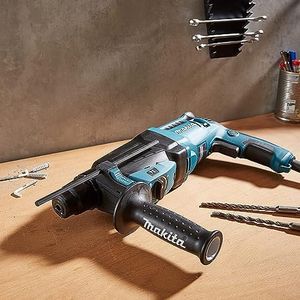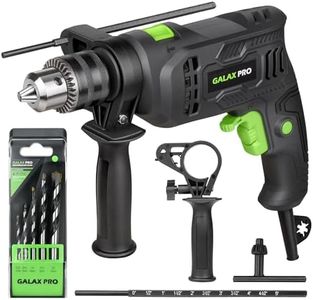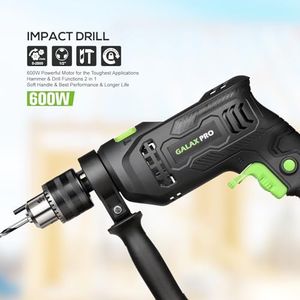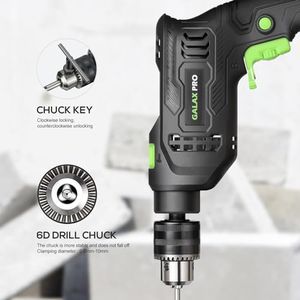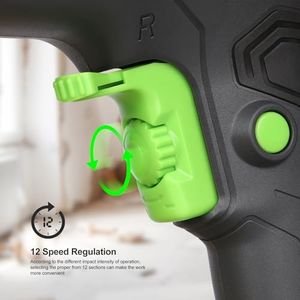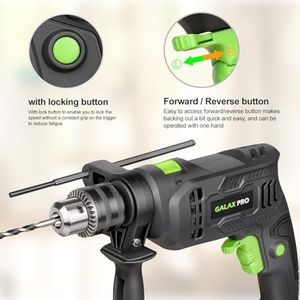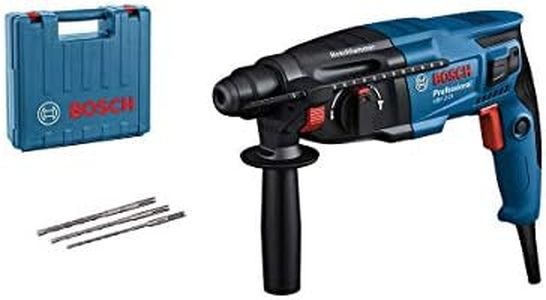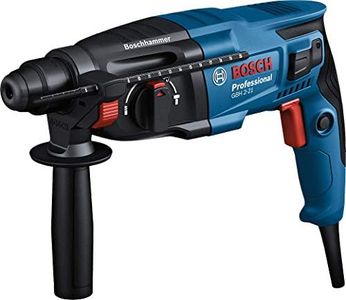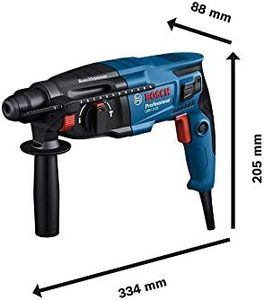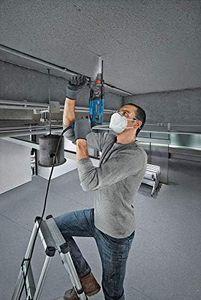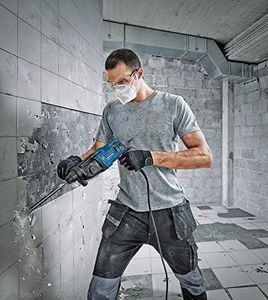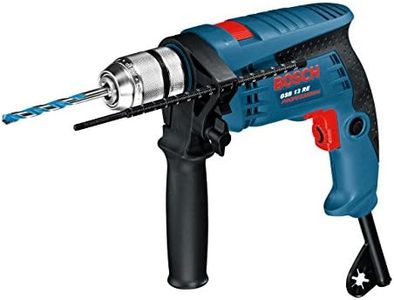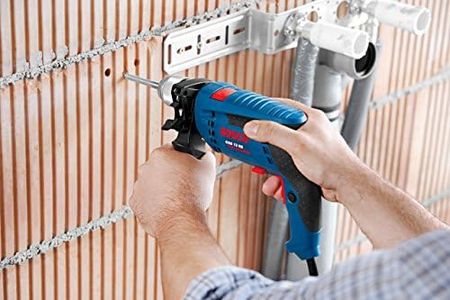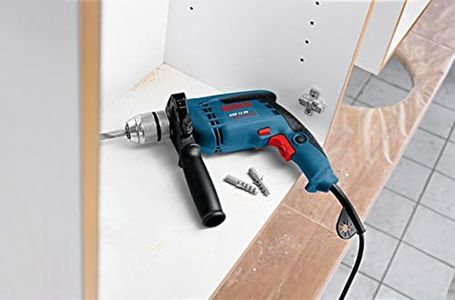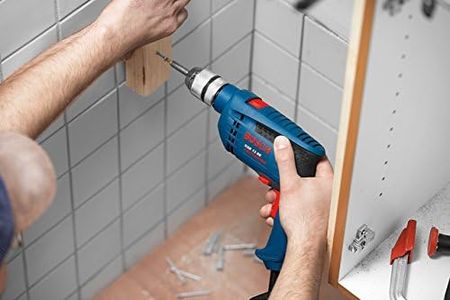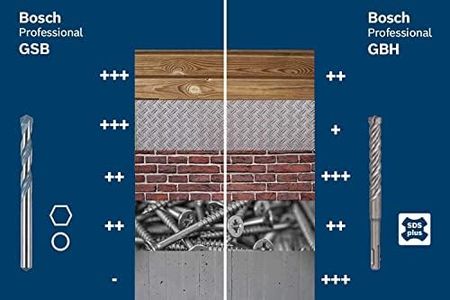We Use CookiesWe use cookies to enhance the security, performance,
functionality and for analytical and promotional activities. By continuing to browse this site you
are agreeing to our privacy policy
10 Best Corded Hammer Drill
From leading brands and best sellers available on the web.Top 10 Best Corded Hammer Drill 2025 in the UK
#1
Winner
BLACK+DECKER 500W Electric Hammer Drill, Powerful 0-49,300 BPM for Masonry and Concrete, Compact Design with Side Handle, BEH200-GB
BLACK+DECKER 500W Electric Hammer Drill, Powerful 0-49,300 BPM for Masonry and Concrete, Compact Design with Side Handle, BEH200-GB
Power (Amps): 16,000 Amps
Speed (RPM): 2900 RPM
Hammering Rate (BPM): 32,300 blows/min
Weight: 1.78 kg
Durability and Build Quality: Metal and high-strength plastic
Additional Features: Variable speed, lock-on, spindle lock
Chosen by 1212 this week
BLACK+DECKER 450 W Hammer Drill Power Tool, BEH201-GB
BLACK+DECKER 450 W Hammer Drill Power Tool, BEH201-GB
Power (Amps): 6 Amps
Speed (RPM): 2800 RPM
Hammering Rate (BPM): 48000 beats per minute
Chuck Size: 10 mm
Weight: 1.66 kg
Durability and Build Quality: Metal parts
Additional Features: Secondary handle, quick-release chuck
DEWALT D25133K-GB SDS Plus 3 Mode Hammer Drill, 26mm Ø, 240V, 33.5cm x 21cm x 7.5cm
DEWALT D25133K-GB SDS Plus 3 Mode Hammer Drill, 26mm Ø, 240V, 33.5cm x 21cm x 7.5cm
Power (Amps): 7 Amps
Speed (RPM): 1500 RPM
Chuck Size: 18 mm
Weight: 4.3 kg
Durability and Build Quality: Metal construction
Additional Features: Variable speed, impact-stop, rotation-stop
Bosch Rotary Hammer PBH 2100 RE (550 watts, in case)
Bosch Rotary Hammer PBH 2100 RE (550 watts, in case)
Power (Amps): 3 Amps
Speed (RPM): 2300 RPM
Chuck Size: Quick Release Chuck
Weight: 2.2 kg
Durability and Build Quality: Robust
Additional Features: SDS plus, impact stop, rotation stop
Bosch Professional 06112A3070 Rotary Hammer Drill GBH 2-26 (230 V, SDS Plus , 830 W, in Carrying Case) , Navy Blue
Bosch Professional 06112A3070 Rotary Hammer Drill GBH 2-26 (230 V, SDS Plus , 830 W, in Carrying Case) , Navy Blue
Speed (RPM): 900 RPM
Chuck Size: 10 mm
Weight: 3.15 kg
Durability and Build Quality: high-quality
Additional Features: 3 modes, chisel mode, handle, case
Makita HR2630 26 mm 3 Mode SDS Plus Rotary Hammer Drill,Blue
Makita HR2630 26 mm 3 Mode SDS Plus Rotary Hammer Drill,Blue
Power (Amps): 18 Amps
Speed (RPM): 1200 RPM
Chuck Size: 26 mm
Weight: 2.8 kg
Durability and Build Quality: Durable
Additional Features: Variable Speed, 3-mode, 40 bit angle
Bosch Professional GBH 2-21 Hammer Drill (230 V, with SDS Plus, incl. 3X SDS Plus Drill bits (6/8/10 mm), Auxiliary Handle, Machine Cloth, Depth Stop, Carrying Case)
Bosch Professional GBH 2-21 Hammer Drill (230 V, with SDS Plus, incl. 3X SDS Plus Drill bits (6/8/10 mm), Auxiliary Handle, Machine Cloth, Depth Stop, Carrying Case)
Power (Amps): 3.13 Amps
Speed (RPM): 1200 RPM
Chuck Size: 13 Millimetres
Weight: 2.3 kg
Durability and Build Quality: robust build quality
Additional Features: three modes, handle, depth stop, case, SDS Plus
#10
Buying Guide for the Best Corded Hammer Drill
Choosing the right corded hammer drill involves understanding your specific needs and the key specifications that will impact the tool's performance and suitability for your tasks. A corded hammer drill is a powerful tool designed for drilling into hard materials like concrete, brick, and stone. It's essential to consider various factors to ensure you get the best fit for your projects. Here are the key specifications to look at and how to navigate them.Power (Amps)Power in corded hammer drills is measured in amps. This spec indicates the electrical current the motor can handle, which translates to the drill's overall power. Higher amps mean more power, which is crucial for heavy-duty tasks. For light to medium tasks, a drill with 6-8 amps should suffice. For more demanding jobs, look for drills with 9-10 amps or more. Consider the type of materials you'll be working with and choose accordingly.
Speed (RPM)Speed, measured in revolutions per minute (RPM), indicates how fast the drill bit rotates. Higher RPMs are useful for drilling through softer materials, while lower RPMs are better for harder materials. Many hammer drills offer variable speed settings, allowing you to adjust the speed based on the task. For general use, a drill with a range of 0-3000 RPM is versatile. If you need precision for different materials, opt for a model with adjustable speed settings.
Hammering Rate (BPM)The hammering rate, measured in blows per minute (BPM), shows how many times the drill's hammer mechanism strikes the material per minute. Higher BPM is beneficial for drilling into tough materials like concrete. For occasional use, a BPM of around 20,000-30,000 is adequate. For frequent or heavy-duty use, look for drills with BPM rates of 40,000 or higher. Match the BPM to the hardness of the materials you'll be working with.
Chuck SizeThe chuck size determines the maximum diameter of the drill bit that the drill can hold. Common sizes are 3/8 inch and 1/2 inch. A 3/8 inch chuck is suitable for lighter tasks and smaller bits, while a 1/2 inch chuck can handle larger bits and more demanding jobs. Consider the types of bits you'll be using and the nature of your projects when choosing the chuck size.
WeightThe weight of the hammer drill affects its ease of use and maneuverability. Lighter drills (around 4-6 pounds) are easier to handle and reduce fatigue during prolonged use, making them ideal for overhead or extended tasks. Heavier drills (7 pounds and up) often offer more power and durability, suitable for heavy-duty applications. Balance the need for power with your ability to comfortably handle the tool.
Durability and Build QualityDurability and build quality are crucial for ensuring the longevity of your hammer drill. Look for models with robust construction, often indicated by metal gear housings and high-quality materials. A durable drill can withstand the rigors of tough jobs and frequent use. Consider the reputation of the brand and user reviews to gauge the build quality.
Additional FeaturesAdditional features can enhance the functionality and convenience of your hammer drill. Look for features like a depth stop for consistent drilling depth, a side handle for better control, and a variable speed trigger for precise control. Some models also offer a dual-mode operation, allowing you to switch between hammer drilling and regular drilling. Identify which features will be most beneficial for your specific tasks.
